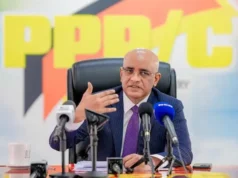ExxonMobil, the lead operator of the oil-rich Stabroek Block, has publicly stated that it is not the least bit worried about Venezuela and the border issue it is involved in with Guyana. It appears, however, that its partner on the block, Hess Corporation, does not share the same sentiments.
In its latest annual report to the Securities Exchange Council (SEC), Hess lamented its concerns about the implications political instability in certain parts of the world can have on its business. In highlighting its concerns about Guyana, the company said, “…Geographic territorial border disputes may affect our business in certain areas, such as the border dispute between Guyana and Venezuela over a portion of the Stabroek Block.”
The operator stressed to the SEC that political instability exposes its operations to increased risks, including increased difficulty in obtaining required permits and government approvals. It also told the commission that enforcing its agreements in those jurisdictions can result in potential adverse actions by local government authorities.
The border dispute between Guyana and Venezuela dates back to 1895. Venezuela claimed that the Essequibo region, Guyana’s largest county and a significant holder of the country’s natural resources such as gold, forms part of its territory. Through intervention by the US, subsequent arbitration led to the bulk of the disputed territory being awarded to Guyana. But in 1962, Venezuela declared that it would no longer abide by the previous arbitration decision and it renewed its claim to the Essequibo region.
In 1990, the United Nations initiated the good offices process to mediate discussions between the two countries in order to resolve the dispute. Although negotiations were difficult to begin with, they were further complicated by the significant discovery of oil deposits in the Stabroek block, which is a part of the disputed region, in 2015. To date, the discoveries in the Stabroek Block have jumped to 5.5 billion barrels of oil equivalent resources.
Guyana has since applied to the International Court of Justice for a resolution on the matter but Venezuela has refused to participate in the process.
Furthermore, Guyana was not the only country singled out as posing a risk to Hess’ bottom line. The company also told the SEC that political instability and civil unrest in North Africa, South America, and the Middle East has affected and may continue to affect its interests in these areas as well as oil and gas markets generally.













